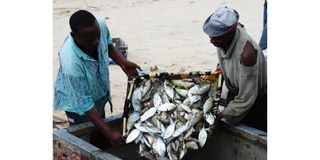Prime
Tanzania’s fisheries policy basks in global limelight

What you need to know:
- Delegates to the African Small-Scale Fisheries Summit (ASSF) hailed Tanzania as a role model insofar as its implementation of the action plan for the development of small-scale fishers is concerned
Dar es Salaam. Tanzania’s empowerment of small-scale fishers has drawn praise at an international meeting in Dar es Salaam, with participants terming it “exemplary”.
Delegates to the African Small-Scale Fisheries Summit (ASSF) hailed Tanzania as a role model insofar as its implementation of the action plan for the development of small-scale fishers is concerned.
The three-day meeting opened on Wednesday and has drawn about 400 participants from all over the world. It is the first time the gathering is taking place in Africa.
Delegates commended President Samia Suluhu Hassan’s leadership in pioneering the implementation of small-scale fishing guidelines in line with the national plan of action and how it fits within the implementation of the African Union policy framework.
“We are aware that the government of Tanzania has shown its leadership in this field by implementing small-scale fisheries guidelines,” Southern African Development Community (Sadc) deputy executive secretary for regional integration Angele N’tumba said.
She added that Tanzania became the first country in the world in 2021 to implement small-scale fisheries guidelines, which are testimony to the importance of the industry in the country.
The guidelines are vital since they revolve around strategies, policies and legal frameworks related to small-scale fisheries and matters that affect the lives and livelihoods of fishing communities, which are responsible for more than half of the global fish catches, Ms N’tumba said.
Sadc and its partners are thus working hard to help member states to combat illegal fishing and reduce post-harvest losses that are estimated to be between 40 percent and 50 percent.
President Hassan in January handed over 222 fishing cages and 55 boats to fishers to boost fishing efficiency and productivity in the Lake Zone regions of Mwanza, Mara and Kagera.
She outlined several key initiatives, including the acquisition of vessels for deep-sea fishing and the introduction of cage fish farming across major lakes.
The efforts underscore the government’s commitment to maximising the benefits of Tanzania’s fisheries sector.
In line with the guidelines, Livestock and Fisheries Development minister Abdallah Ulega told Parliament the government will in the 2024/25 financial year implement several projects, including completing the construction of a fish market port in Kilwa and commencing preliminary preparations for the construction of a similar facility in Bagamoyo.
“The ministry will also finalise the establishment of a body to oversee and develop fisheries resources and aquaculture and continue with plans to procure four deep-sea fishing vessels through Tanzania Fisheries Corporation (Tafico) and construct a fish processing and fish feed production plants.
“The ministry will also facilitate the purchase of 450 boats and fishing gear through the Emergency Connectivity Fund (ECF) window and the Tanzania Scaling Up Sustainable Marine (Tasfam) project as well as empowering 300 groups of seaweed farmers,” Mr Ulega added.
Requesting Parliament to endorse Sh460.3 billion as the ministry’s 2024/25 budget, Mr Ulenga said other projects to be implemented include the purchase of a fishing training vessel through the Tasfam project, purchase of 60 buoys and seven drones and installation of a tracking system for fishing vessels.
Other projects to be implemented are the facilitation of the purchase of 497 fish cages through ECF and the establishment of demonstration farms for aquaculture development in 20 districts. All projects will be implemented through the ministry’s Sh363.1 billion development budget, which is Sh166.8 billion more than the development allocation for the current financial year.
It was against the backdrop of these developments that African Union-InterAfrican Bureau for Animal Resources (AU-IBAR) fisheries officer Hellen Moepi-Guebama commended President Hassan for hosting the first summit dedicated to small-scale fisheries in Africa.
“Her leadership is evident by her pioneering the implementation of small-scale fisheries guidelines through the national plan of action as well as the country’s implementation of the AU policy framework and reform for fisheries and aquaculture in Africa,” she said.
Ms Moepi-Guebama also praised Mr Ulega as the champion for small-scale fisheries in Africa. “We appreciate your support in this agenda. I called upon all partners present here to realise this vision,” she said.
In his remarks, a representative from the Food and Agriculture Organisation (FAO), Dr Nyabenyi Tipo, commended President Hassan for her visionary approach of collaborating with key stakeholders in the fisheries sector.
FAO estimates that at least 60 million people in Africa are involved in small-scale fishing. The sector produces fish valued at $10 billion annually, according FAO estimates.
Dr Tipo said small-scale fisheries were the backbone of the sector which understands the ecosystem more than anyone else in the fishing industry.




